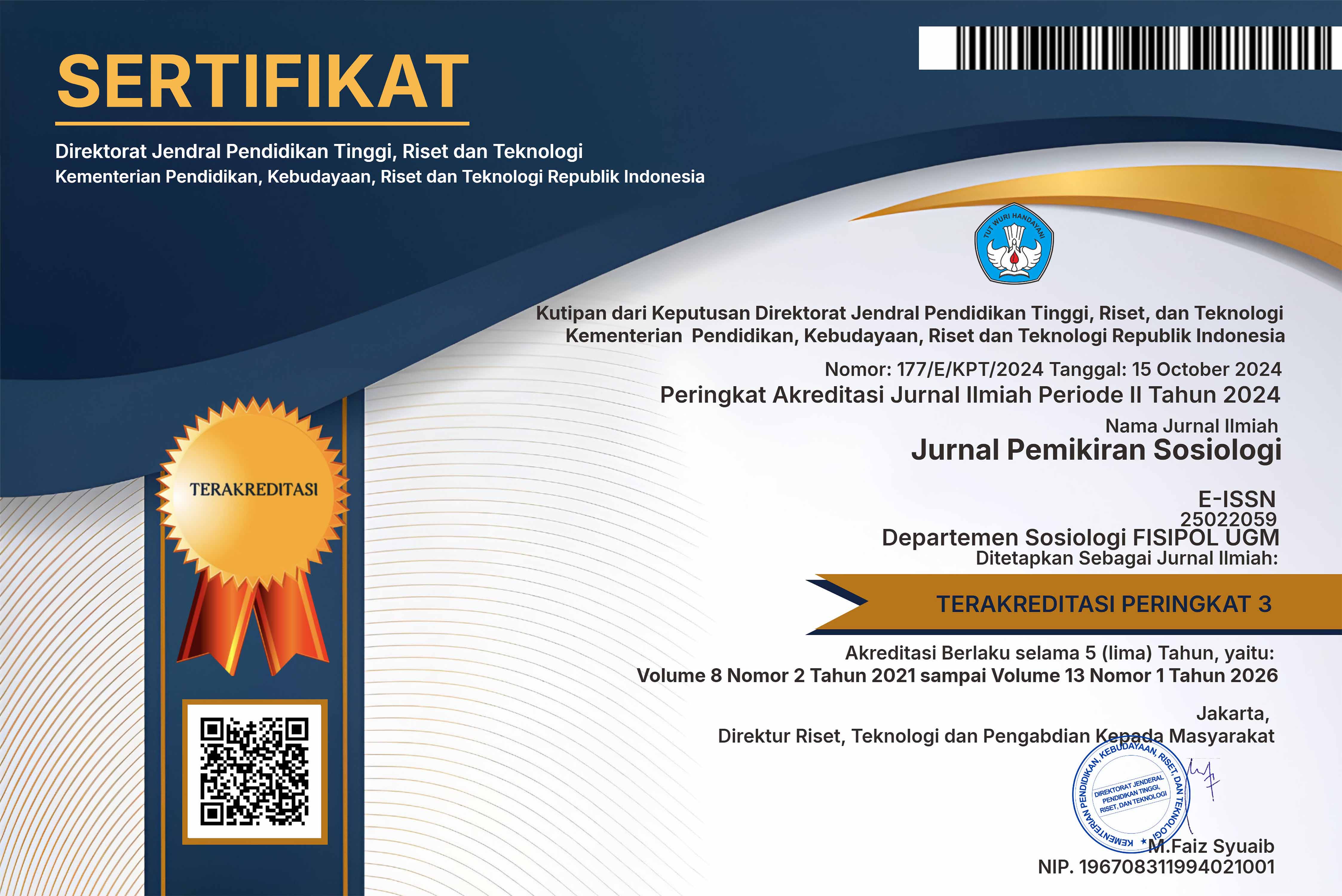The Role of Patronage in Shaping Indonesia's Political Landscape
Silvia Annisa(1*), Bonar Situmorang(2)
(1) Department of Sociology, Universitas Sumatera Utara, Indonesia
(2) Department of Sociology, Universitas Gadjah Mada, Indonesia
(*) Corresponding Author
Abstract
This article presents a systematic literature review on the role of patronage in shaping Indonesia's political landscape. Using a systematic literature review approach, the article analyzes 30 selected articles out of a total of 250 articles that underwent identification and screening processes. The main focus of this review is to explore how political patronage influences power structures, political participation, and the dynamics of relations between political elites and the public in Indonesia. Drawing on Michel Foucault's theory of power and knowledge, the article explores how patronage not only functions as a tool for distributing resources but also plays a crucial role in the construction and dissemination of political knowledge. According to Foucault, power is not just imposed from above but operates through networks of relationships, shaping the way knowledge is produced and legitimized. Patronage systems produce specific truths that validate the power structures and create a discourse that legitimizes inequality and exclusion. The findings suggest that patronage remains an essential tool in political mobilization, influencing both the distribution of resources and the strengthening of social and political networks. However, the complexity of patronage also poses challenges for the development of an inclusive and transparent democracy. This article provides a deeper understanding of the influence of patronage in Indonesian politics, offering insights for the development of more just and sustainable political policies, while reflecting on Foucault’s ideas about how knowledge and power intertwine to shape political realities.
Keywords
Full Text:
PDFReferences
Aspinall, Edward. 2015. “The Surprising Democratic Behemoth: Indonesia in Comparative Asian Perspective.” The Journal of Asian Studies 74(4):889–902. doi: 10.1017/s0021911815001138.
Azkia, Laila. 2019. “Globalisasi Sebagai Proses Sosial Dalam Teor-Teori Sosial.” Tarbiyah: Jurnal Ilmiah Kependidikan 8(1):13–27.
Baswedan, Anies R. 2007. “Indonesian Politics in 2007: The Presidency, Local Elections and the Future of Democracy.” Bulletin of Indonesian Economic Studies 43(3):323–40.
Beck, Ulrich. 1992. “Risk Society: Towards a New Modernity.” Sage Google Schola 2:53–74.
Blunt, Peter, Mark Turner, and Hendrik Lindroth. 2012. “Patronage’s Progress in Post‐soeharto Indonesia.” Public Administration and Development 32(1):64–81. doi: 10.1002/pad.617.
Cahyati, Devy D., and Yonatan H. L. Lopo. 2019. “Daily Patronage Politics: A Village Chief’s Route to Power.” PCD Journal 7(2):169. doi: 10.22146/pcd.51737.
Chen, Shuyan, and Junhao Zhang. 2023. “Exploring the Political Thoughts and Social Influences of Schmitt and Foucault.” Lecture Notes in Education Psychology and Public Media 25(1):18–26. doi: 10.54254/2753-7048/25/20230255.
Choi, Nankyung. 2007. “Elections, Parties and Elites in Indonesia’s Local Politics.” South East Asia Research 15(3):325–54.
Creswell, John W., and Cheryl N. Poth. 2016. Qualitative Inquiry and Research Design: Choosing among Five Approaches. Sage publications.
Dewi, Diana Setiyo, and Tiur Nurlini Wenang Tobing. 2021. “Optimalisasi Penyelenggaran Pelayanan Publik Dalam Masa Perubahan Melawan COVID-19 Di Indonesia.” JISAMAR (Journal of Information System, Applied, Management, Accounting and Research) 5(1):210–14.
Erawan, I. G. A., Fadillah Putra, and I. Gede Eko Putra Sri Sentanu. 2022. “The Roles of Balanced Scorecard in Improving Performance Accountability System in Indonesian Government Organizations.” Jurnal Borneo Administrator 18(2):201–12. doi: 10.24258/jba.v18i2.1001.
Gray, I., and M. Crichton. 2014. “Replacing Trains with Coaches: Implications for Social Inclusion in Rural New South Wales.” Journal of Social Inclusion 5(2):89–113. doi: 10.36251/josi.78.
Gyene, Pál. 2019. “Democracy, Islam and Party System in Indonesia: Towards a Consensus-Oriented Model?” PCD Journal 7(1):27. doi: 10.22146/pcd.41970.
Hadiz, Vedi R. 2013. “The Rise of Capital and the Necessity of Political Economy.” Journal of Contemporary Asia 43(2):208–25.
Haryanto. 2024. “Business and Politics in Urban Indonesia: Patrimonialism, Oligarchy and the State in Two Towns.” Journal of Current Southeast Asian Affairs 43(2):177–97. doi: 10.1177/18681034241264574.
Jurnali, Teddy, and Siti N. A. Khalid. 2015. “Performance Management System for Local Government: The Indonesian Experience.” Global Business Review 16(3):351–63. doi: 10.1177/0972150915569923.
Komisi Pemberantasan Korupsi. 2023. “Tiga Kasus Korupsi dengan Kerugian Negara Terbesar di Indonesia” Retrieved March 13, 2024 (https://aclc.kpk.go.id/aksi-informasi/Eksplorasi/20231120-tiga-kasus-korupsi-dengan-kerugian-negara-terbesar-di-indonesia)
MacRae, Graeme, and I. Nyoman Darma Putra. 2007. “A New Theatre-State in Bali? Aristocracies, the Media and Cultural Revival in the 2005 Local Elections.” Asian Studies Review 31(2):171–89.
Means, Alexander J. 2021. “Foucault, Biopolitics, and the Critique of State Reason.” Educational Philosophy and Theory 54(12):1968–69. doi: 10.1080/00131857.2021.1871895.
Novianti, Khusnul R. 2018. “Cultural Dimension Issues in Indonesia Human Resource Management Practices: A Structured Literature Review.” Mec-J (Management and Economics Journal) 2(3):245–56. doi: 10.18860/mec-j.v0i0.5073.
Nye, J. S. 1967. Corruption and Political Development: A Cost-Benefit Analysis. Vol. 61.
Pappas, Takis S. 2009. “Patrons Against Partisans.” Party Politics 15(3):315–34. doi: 10.1177/1354068809102247.
Rizaty, Monavia Ayu. 2022. Survei: Ketertarikan Anak Muda terhadap Politik Masih Rendah. Data Indonesia. Retrieved March 13, 2024 (https://dataindonesia.id/varia/detail/survei-ketertarikan-anak-muda-terhadap-politik-masih-rendah)
Rosser, Andrew, P. D. C. King, and Danang Widoyoko. 2022. “The Political Economy of the Learning Crisis in Indonesia.” doi: 10.35489/bsg-rise-2022/pe01.
Scott, James C. 1972. Patron-Client Politics and Political Change in Southeast Asia. Vol. 66.
Shin, Jae H. 2015. “Voter Demands for Patronage: Evidence From Indonesia.” Journal of East Asian Studies 15(1):127–51. doi: 10.1017/s1598240800004197.
Tambunan, Derwin. 2023. “The Intervention of Oligarchy in the Indonesian Legislative Process.” Asian Journal of Comparative Politics 8(2):637–53. doi: 10.1177/20578911231159395.
Tanasaldy, Taufiq. 2015. “A Decade after the Reform: Political Activism of the Chinese of West Kalimantan, Indonesia.” Asian Ethnicity 16(4):446–79. doi: 10.1080/14631369.2015.1005035.
Titeca, Kristof. 2006. “Political Patronage and Political Values: The Developmental Role of Political Patronage and Its Impact on Shaping Political Values in Rural Uganda.” Afrika Focus 19(1). doi: 10.21825/af.v19i1.5414.
Trihartono, Agus. 2014. Beyond Measuring the Voice of the People: The Evolving Role of Political Polling in Indonesia’s Local Leader Elections. Vol. 3.
Warburton, Eve, Burhanuddin Muhtadi, Edward Aspinall, and Diego Fossati. 2021. “When Does Class Matter? Unequal Representation in Indonesian Legislatures.” Third World Quarterly 42(6):1252–75. doi: 10.1080/01436597.2021.1882297.
Wilson, Woodrow. 1887. The Study of Administration. Vol. 2.
Article Metrics
Refbacks
- There are currently no refbacks.
Copyright (c) 2025 Jurnal Pemikiran Sosiologi

This work is licensed under a Creative Commons Attribution-ShareAlike 4.0 International License.
Jurnal Pemikiran Sosiologi Indexed by:
ISSN 2252-570X (Print), ISSN 2502-2059 (online).


















